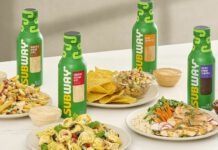In late 2019, the North-American foodservice industry was reeling with the runaway success of “plant-based” burgers from suppliers such as Beyond Meat and Impossible Foods. The effects of the pandemic may be obscuring overall dining trends for the moment, but the plant-based trend looks set not only to persist post-COVID-19, but to make up an increasing portion of the total dining spend.
Various demographic segments have different reasons for wanting to eat these vegetarian or vegan foods that resemble animal protein, says Dana McCauley, a food-trend expert at University of Guelph. “In the Boomer segment, they still want to have a burger or a taco but be more heart-healthy and get away from the cholesterol and fats. In the younger generations, it’s more ‘flavour of the month’. A really interesting group for me is the Gen Z — 25 and under — they’re much more interested in sustainability,” she says.
As diners increasingly embrace the idea of “flexitarian” eating — a part-vegetarian, part-carnivorous regime — the national infrastructure for plant-based food production is expanding. Since the fall of 2018, Canada has had a Certified Plant-Based program overseen by Plant-Based Foods of Canada (PBFC),
whose members include such food producers as Beyond Meat, Modern Plant Based Foods (formerly known as Modern Meat), Nabati Foods Inc. and Kellogg’s, as well as retailers and other industry stakeholders.
Investors are taking notice of this niche, which may create the effect of a self-fulfilling prophecy as those with deep pockets support the research and development of innovative products with consumer appeal. For instance, McCauley mentions Whitecap Venture Partners’ success with Mother Raw, a producer of plant-based dressings, dips and condiments; BDC Capital and District Ventures Capital recently announced a combined $10-million equity investment into Outcast Foods, which processes waste produce into sustainable food products.
Government is also stepping up. Last June, the federal government invested just under $100 million into Merit Functional Foods in Winnipeg. The company is building a 94,000-sq.-ft. plant-protein production facility in Winnipeg that will process canola and peas. A further $2.5 million from the governments of Canada and Manitoba followed in August for “new technologies” in the facility.
It’s becoming rare for major chains, especially in the QSR segment, to ignore consumer interest in plant-based options. A&W’s Beyond Meat Burger and Harvey’s Lightlife Burger are now well established, and McDonald’s has been experimenting with plant-based products.
“Through our Canadian test of the P.L.T. in 2019, we learned a lot about guest feedback, supply-chain logistics and how the P.L.T. (now the McPlant) impacts restaurant operations,” says Laura Munzar, McDonald’s Canada’s External Communications manager, Corporate Relations. “We continue to evaluate guest demand to inform any menu decisions in the future.”
Last August, KFC Canada made its plant-based KFC sandwich a permanent part of the menu. Developed in collaboration with Lightlife, it replaced an earlier vegetarian sandwich. (Yum! Brands, which includes KFC as well as Pizza Hut and Taco Bell, also announced a strategic partnership with Beyond Meat in February.)
“The new plant-based sandwich, although it’s all made from vegetable material, is more similar in texture and flavour to chicken,” says Ira Dubinsky, Marketing director for KFC Canada. “We’re watching the category and Canadians’ tastes and expectations very closely, and we’re excited about the potential and open to other things in the future.”
Quebec’s beloved chicken chain, St-Hubert Group, already has a strong retail presence and in January, the brand launched three flavours of plant-based pot pies into grocery stores.
The chicken pot pies are based on soy protein, “and it’s texturized in a way that almost looks like real chicken,” says St-Hubert director of Communications Josée Vaillancourt. “In the vegetarian chili, it’s pea protein with quinoa and black beans.” The same vegetarian-chicken product is used in the dining rooms as Crispy Veggie Strips (about $16) and the Bangkok Salad with Crispy Veggie Strips (about $17). St-Hubert is also planning to roll out a vegetarian poutine and a vegetarian wrap, using the same chicken-style veggie strips.
In January, Chipotle made its Cilantro-Lime Cauliflower Rice (grilled, riced cauliflower, priced at $2 more than white rice) a standard menu item in Canada and the U.S. “Prior to last summer’s Cilantro-Lime Cauliflower Rice pilot, one out of three new menu-item requests from Chipotle customers had been for cauliflower rice,” says Stephanie Perdue, vice-president of Marketing at Chipotle.
Chipotle also offers a soybean-based sofritas. “The growth potential for plant-based foods is very strong, and we expect more restaurants in the fast-casual space to invest in plant-based menu items over the next several years,” she says.
“In the fast-casual segment and in finer dining, I would say it’s ubiquitous now to have something on your menu that appeals to the plant-based consumer — not just to the earnest vegetarian, but the flexitarian,” says McCauley, who predicts growth in versatile ingredients such as plant-based “ground beef” that can be incorporated into any dish by any type of kitchen.
“I really and truly believe, 100 years from now, that eating a big old steak or a big piece of chicken is going to be less common,” she says. “We’re not going to heal this planet with just a few burgers; we’re going to have to make some changes, and I see Gen Z feeding this change.” – BY SARAH B. HOOD


















